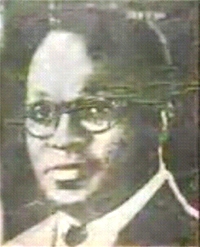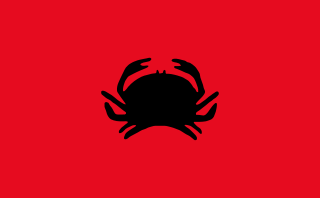
The Union of the Peoples of Cameroon is a political party in Cameroon.
Alexandre Biyidi Awala, known as Mongo Beti or Eza Boto, was a Cameroonian author and polemicist. Beti has been called one of the most perceptive French-African writers in his presentations of African life.
Articles related to Cameroon include:
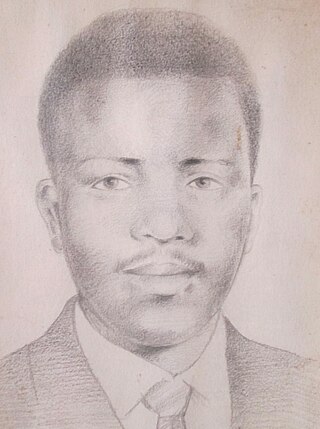
Félix-Roland Moumié was an anti-colonialist Cameroonian leader, assassinated in Geneva on 3 November 1960 by an agent of the SDECE with thallium, following official independence from France earlier that year. Félix-Roland Moumié succeeded Ruben Um Nyobé, who was killed in September 1958, as leader of the Union des Populations du Cameroun.
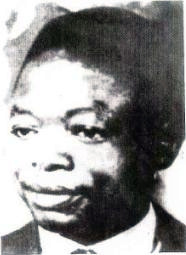
Ruben Um Nyobè was an anti-colonialist Cameroonian leader, slain by the French army on 13 September 1958, near his natal village of Boumnyebel, in the department of Nyong-et-Kellé in the maquis Bassa.

Andre-Marie Mbida was a Cameroonian statesman, a nationalist, the first Cameroonian to be elected Member of Parliament at the French National Assembly, a Prime Minister of Cameroon, the second African-born Prime Minister in Sub-Saharan Africa, the first Head of State of French-speaking autonomous Cameroon from 12 May 1957 to 16 February 1958, and the first political prisoner of independent Cameroon from 29 June 1962 to 29 June 1965.
Augustin Frédéric Kodock was a Cameroonian politician who was Secretary-General of the Union of the Peoples of Cameroon from 1991 to 2011. He worked in Cameroon's state administration during the 1960s and then worked at the African Development Bank through the 1970s. After a stint as head of Cameroon Airlines in the mid-1980s, he participated in the beginnings of multiparty politics in the early 1990s, becoming Secretary-General of the UPC. Allying himself with President Paul Biya, he was appointed to the government as Minister of State for Planning and Regional Development from 1992 to 1994 and then as Minister of State for Agriculture from 1994 to 1997. Subsequently, he was again Minister of State for Agriculture from 2002 to 2004 and Minister of State for Planning from 2004 to 2007.
The Black African Students Federation in France was an organization of African students in France. FEANF was influenced by the French Communist Party, and saw the struggle against French colonialism in Africa as part of a wider struggle against Western imperialism. FEANF played an important role for the formation of communist organizations in Francophone Africa. In addition, FEANF largely contributed to creating a centralized voice that united all African student groups in France, while their actions highlighted the greater disparities within the French colonial system.

French Cameroon, also known as the French Cameroons, was a French mandate territory in Central Africa. It now forms part of the independent country of Cameroon.

Simon Pierre Tchoungui was a medical doctor who was appointed Prime Minister of East Cameroon from October 1965 until 20 May 1972, when the United Republic of Cameroon came into being.
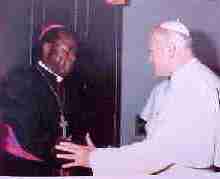
Albert Ndongmo was Bishop of Nkongsamba in Cameroon between June 1964 and January 1973. In 1970 he was arrested, accused of treasonous dealings with rebels, and sentenced to death by a military tribunal. His sentence was later commuted to life imprisonment, of which he served five years before the President ordered his release. After being released he moved to Rome and then to Canada, where he spent the rest of his life.
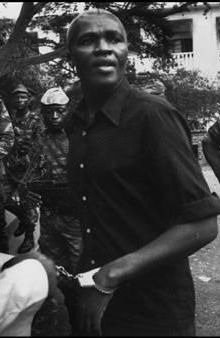
Ernest Ouandié was a leader of the struggle for independence of Cameroon in the 1950s who continued to resist the government of President Ahmadou Ahidjo after Cameroon became independent in 1960. He was captured in 1970, tried and condemned to the death. On 15 January 1971, he was publicly executed in Bafoussam.
Boumnyébel is a community in Cameroon about 120 kilometres (75 mi) along the road from Yaoundé to Douala. The village is on the road from Edéa to Yaoundé, at the junction with the road from Bafia.
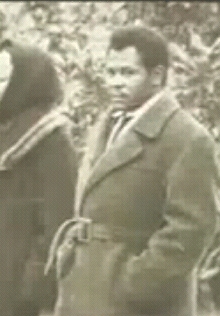
Abel Kingué was a political leader in the struggle for the independence of Cameroon from France.
Tankeu Noé was a member of the Union of the Peoples of Cameroon (UPC) guerrilla forces in Cameroon fighting first against French colonial government and then against the government of Ahmadou Ahidjo in the Douala region.

Ndeh Ntumazah was a leader of the pro-independence movement in Cameroon in the 1950s. He was forced into exile, and was unable to return to his country until 1991, when he returned to the political fray. After his death he was honoured by an official burial.
The Cameroon War is the name of the independence struggle between Cameroon's nationalist movement and France. The movement was spearheaded by the Cameroonian Peoples Union (UPC). Even after independence, the rebellion continued, shaping contemporary politics. The war began with riots in 1955 and continued after Cameroon gained independence in 1960. Following independence, the first President of Cameroon, Ahmadou Ahidjo requested continued French military intervention to fight the UPC rebels. The UPC rebellion was largely crushed by the Cameroonian Armed Forces and French Army by 1964. This war is often forgotten because it occurred at the height of France's biggest colonial independence struggle, the Algerian War.
Theatre of Cameroon consists in the theatrical plays produced across Cameroon. Its history dates back to the pre-colonial time, but it has gained wide popularity since the 1970s, with practitioners such as Daniel Ndo, Dieudonné Afana and David Kemzeu. It is made of different trends, some of them are more inflected by the European theatrical tradition, some others are more attuned to the indigenous performative styles. The comic genre is presently dominating so that laughter has become synonymous with modern Cameroon theatre productions, according to Bole Butake. Theatre of Cameroon is sometimes subdivided in traditional theatre, colonial theatre, and post-independence theatre.
Marie-Claire-Eléonore-Débochère Matip is a Cameroonian writer living in Paris. Her autobiographical novel Ngonda, published in 1958, is one of the first French-language texts to be published by a sub-Saharan African woman.
Albert Mbida is a Cameroonian senator and university lecturer.
